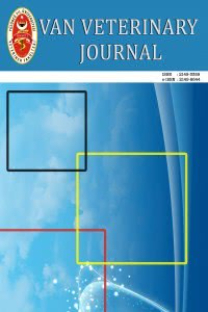Some trace elements and vitamins A,C and E levels in ewes infected with gastrointestinal parasites
parazitlenme, eser element eksikliği, E vitamini, bakır, retinol, koyun, askorbik asit, mide-bağırsak hastalıkları, demir, parasitoz, eser elementler, çinko
Mide-barsak parazitlerle enfekte koyunlarda bazı iz alementler ve vitamin A,C ve E düzeyleri
parasitism, trace element deficiencies, vitamin E, copper, retinol, sheep, ascorbic acid, gastrointestinal diseases, iron, parasitoses, trace elements, zinc,
___
- 1. Albers G A, Gray G D, Le Jambre LF, Barger IA, Barker J S (1990): The effect of Haemonchus contortus infection on hematological parameters in young merino sheep and its significance for productivity. Animal Productive, 50: 99-100.
- 2. Bang K S, Hamilton A S, Sykes A R (1990): Effect of ostertagiasis on copper status in sheep: a study involving use of copper oxide wire particles. Res. Vet. Sci. 49: 306-314.
- 3. Beisel W R (1977): Zinc metabolism in infection. in zinc metabolism: current aspect in health and disease. G J. Brewer and A. S. Prasad, eds, Alan R. Liss, New York, p.155-176.
- 4. Boch J, Supperer R (1983): Veterinaermedizinische Parasitogie., 3. Aufl. Paul Parey Verlag, Berlin und Hamburg,
- 5. Dynes R A, Poppi D P, Barrell G K, Sykes A R (1998): Elevation of feed intake in parasite-infected lambs by central administration of a cholecystokin receptor antagonist. British Journal Nutrition 79: 47-54.
- 6. Holmes P H, Maclean J M (1971): The pathophysiology of ovine ostertagiasis: a study of the changes in plasma protein metabolism following single infections. Res.Vet. Sci., 12: 265-271.
- 7. Issi M, Gül Y, Dabak M (2001): Serum vitamin C levels in goats with Pestes des Petits Ruminants (PPR). Turk. J. Vet.Anım. Sci., 25: 539-544.
- 8. Kaya A (2000): Effect of intravenous injection of ascorbic acid solution on some hematological and biochemical parameters in healthy sheep and sheep with natural-chronical liver flukes. PhD thesis, Journal of Health Sciences of Yuzuncu Yil University
- 9. Kolb E (1984): Metabolism of ascorbic acid in livestock under pathological conditions. Ed. Wegger, I., Tagwerker, F.J. and Moustgaard, J. In: Workshop. Ascorbic acid in Domestic Animals. Royal Danish Agr Soc Copenhagen, 162-168.
- 10. Koski K G, Scott M E (2001): Gastrointestinal nematodes, trace elements, and immunity: breaking the negative spiral. Annual Revıew of Nutrıtıon, 21: 297-321.
- 11. Kozat S, Yüksek N, Altug N, Agaoglu Z T, Erçin F (2003): Studies on the effect of iron (Fe) preparations in addition to Babesiosis treatment on the haematological and some mineral levels in sheep naturally infected with Babesia ovis. Journal of the Faculty of Veterinary Medicine University of Yuzuncu Yıl, 14: 18-21.
- 12. Marinho H A, Shrimpton R, Giugliano R, Burini R C (1991): Influence of enteral parasites on the blood vitamin A levels in preschool children orally supplemented with retinol and / or Zinc. Clinical Nutrition, 45: 539-544.
- 13. Mcdowell L R (2000): Reevaluation of the metabolic essentiality of the vitamins – Review. Asian-Australasian Journal Animal Sciences, 13: 115-125.
- 14. Miller K W, Yang C S (1985): An Isocratic High- Performance Liquid Chromatography Method for the simultaneous analysis of plasma retinol, -tocopherol and various carotenoids. Analytical Biochemistry, 145: 21-26.
- 15. Murray J, Murray A, Murray N (1978): Anorexia sentinel of host defence ? Perspectives in Biology and Medicine, 22: 134-142.
- 16. Nazki A R, Rattan P J S (1990): Status of blood microelements during different season in ewes. Indian Vet. J. 67: 274-276.
- 17. Rahman M M, Wahed M A, Fuchs G J, Baqui A H, Alvarez J O (2002): Synergistic effect of zinc and vitamin A the biochemical of vitamin A nutrition in children. Australasian Journal Clinical Nutrition, 75: 92-98.
- 18. Reynolds S L, Judd H J (1984): Rapid procedure for the determination of vitamins A and D in fortified skimmed milk powder using high-performance liquid chromatography. Analyst, April 109: 489-492.
- 19. Sarin K, Kumar A, Prakash A, Sharma A (1993): Oxidative stress and antioxidant defence mechanism in Plasmodium vivax malaria before and after chloroquin treatment. Indian J. Malariol., 30: 127-133.
- 20. Sykes A R (1994): Parasitism and production in farm animals. Animal Production, 59: 155-172.
- 21. Symons L E (1983): Plasma zinc and inappetence in sheep infected with Trichostrongylus columbriformis. J.Comp. Pathol. 93: 547-550.
- 22.Voyvoda H, Sekin S, Kaya A, Bildik A (1997): Modifications of serum iron, copper concentration (SI, Cu), total and latent ironbinding capacity (TIBC, LIBC), and transferrin saturation (TS) in natural Babesia ovis infection of Sheep. Tr. J. Vet. Anım. Sci. 21: 31-37.11
- 23. Whitlock HV (1948): Some modification of the Mc master helminth egg-counting techniques and apparatus. Journal of the Council for Scientific and Industrial Research, 21: 177-180.
- 24. Van Houter M F, Sykes A R (1996): Implications of nutrition for the ability of ruminants to withstand gastrointestinal nematode infections. Int. J Parasıtol. 26: 1151-1167.
- ISSN: 1017-8422
- Yayın Aralığı: 3
- Başlangıç: 1990
- Yayıncı: Yüzüncü Yıl Üniv. Veteriner Fak.
Yunus ÇETİN, İbrahim H. YÖRÜK, İbrahim TAŞAL
İbrahim TAŞAL, İbrahim H. YÖRÜK, YUNUS ÇETİN
Some trace elements and vitamins A,C and E levels in ewes infected with gastrointestinal parasites
SÜLEYMAN KOZAT, Yaşar GÖZ, İbrahim Hakkı YÖRÜK
Van yöresi köpeklerinde Dirofilaria immitis'in seroprevalansı
Nuri ALTUĞ, Zahit AĞAOĞLU, İ.Soner KOLTAŞ, Mehtap DEMİRKAZIK, Nazmi YÜKSEK, Yaşar GÖZ
Van ili köpeklerinde sabin-feldman boya testi ile toxoplasma gondii'nin seroprevalansı
Taylan Ayşegül ÖZKAN, Nuri ALTUĞ, Cahit BABÜR, Selçuk KILIÇ, Yaşar GÖZ
Alabalık fletolarında farklı yöntemlerle Listeria monocytogenes'in araştırılması
